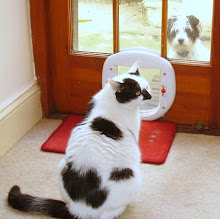The latest missive for Cornwall Today -
A ‘new’ hip has given Debbie Davis a new lease of life
62 year old Debbie Davis walked up the steep hill from Falmouth and stood outside her front door where, to her neighbour’s amazement, she shouted, “I’m free!” This was the first time she had walked without crutches for weeks.
At Easter this year, she underwent an operation for hip resurfacing as the cartilage in her left hip had completely worn away due to osteoarthritis. Hip resurfacing is a relatively new option, only available in the UK for the last 14 years. Mark Norton and two of his colleagues are the only orthopaedic surgeons in Cornwall to provide this service which is mainly for younger people with hip arthritis who wish to remain active.
In hip resurfacing, the hip joint is relined rather than replaced, and the head and neck of the femur are preserved. The worn surfaces of the head and socket are machined away with precision instruments and the joint is then lined with a metal covering for the head and socket.
“As a surgeon you have the ability to change something immediately and get instant feedback via X ray as to whether you’ve done a good job,’ says Mark Norton. “That gives a lot of satisfaction, and I think that’s very attractive to men.
“One of the biggest advantages with hip resurfacing is that there’s a lower chance the ball with come out of the socket if they twist and bend than with a normal hip replacement,” Mark explains. “Another advantage for younger people is that all of these mechanical devices will fail at some point. With resurfacing we haven’t damaged the inside of the femur so if the hip has to be redone it’s more straightforward.”
Debbie had little warning that anything was wrong. “I’d had twinges 5 or 6 years ago, then gradually started getting shooting pains if I turned around or went up steps awkwardly, so the obvious solution was to stop whatever I was doing and the pain went. I’d also had an ache on the inside of the thigh, but only if I’d been on a long walk. I was in denial for a very long time.”
It got to the stage where the pain was happening more often so Debbie went to see her GP. “Initially I was told that the condition had been caught early, and go away and take glucosamine, fish oils and do yoga. I didn’t know I had osteoarthritis.”
There is no history of osteoarthritis in Debbie’s family, but as it’s hereditary, her daughters have been told to look out for any pain in the groin, or sudden and stabbing pains.
“When the pains got worse but were not incapacitating in any way - I was still walking the coastal path - I went back to the doctor and had an X ray. He said I had quite severe osteoarthritis and recommended a hip replacement.” Debbie smiles. “I’m just amazed I wasn’t in as much pain as everyone thought I should have been. I like to think I’m incredibly brave but that’s not true!”
“We really can’t explain why some people feel pain more than others,” Mark says.
“Some people feel pain in the soft tissue around the hip, others from the inside of the bone. People experience pain differently.”
Debbie was referred to a physiotherapist. “She suggested that I was young and active enough to benefit from a resurfacing rather than a replacement,” Debbie says. “This was the first time I’d heard of this. Within a month I had an appointment with Mark Norton at the Duchy and he saw my X ray and agreed that a hip resurfacing operation would be suitable.”
Mark explains further: “Smaller implants don’t function as well as the bigger ones, so small women fare worse with hip resurfacing because they have thinner bones, a higher risk of bones breaking and getting more hip fractures. They are safer with a conventional hip replacement, because if they have a metal hip it can’t break. But it depends on their age. I generally don’t do hip resurfacing in women over 65.”
Debbie had doubts about her operation, but found the session with Mark Norton very helpful. “He had time for me, which made all the difference,” she says. “I was much relieved because he told me exactly what was going to happen. He allayed my fears – I was being a bit of a drama queen and thought that my active life was over, which would have been a huge loss. I was told that with hip resurfacing I could continue to play squash, whereas with a hip replacement I probably couldn’t.” She laughs. “But I haven’t tested this out yet!”
Debbie was booked in within a couple of months, and because the ‘choose and book’ system was used, she was able to go to the Duchy hospital on the NHS. “Mark Norton did the operation, kindly offering at the same time to shave off a slight abnormality that he found in my hip which has the added benefit that I may find I can do the splits which I’ve never been able to do before!” Debbie says.
She suffered some post operative discomfort but that was easily controlled by painkillers. “For the first few days it was quite scary to realise that I couldn’t move my leg off the bed,” Debbie says. “And one of the most difficult things after the operation was having to sleep on my back for six weeks.”
But she made a very swift recovery. “Two days later I was walking aided with crutches at least as far as the bathroom. By the third day I was doing exercises and walking to the rest room and on the fourth day I came home.”
Debbie’s friends and family were worried how she would cope when she came out of hospital, and rallied round to look after her. “After a week of intensive care by good friends and family, I was desperate for them to go so I could look after myself!” she says. And she has never looked back. “I was told to keep using my crutches for 6 weeks but I did cheat a bit. I got away with one crutch for the last 3 weeks.”
Since then she has managed to walk 4 miles on level ground. “I even worked behind the bar in the pub the other night, so I feel that I’m doing quite well,” she says. “In fact I’m absolutely amazed and wondering why I made such a fuss before I went in!”
Now her mobility is good. “I still have a small amount of discomfort at night but not enough to keep me awake. I just have to move more than I used to,” she says. And the only thing she can’t do is get her socks on. “I have to use a special device,” she says, “but I’m hoping that one day I will be able to.”
Although hip resurfacing is relatively recent so there are few statistics available, Debbie’s prognosis is encouraging. “At the moment it’s looking good so I’m feeling pretty positive,” she says. “Although nobody would choose to have any operation, I feel very lucky.”
Cornwall Hip Foundation
t: 01872 870969
f: 01872 870969
e: hipsolutionscornwall@mac.com
w: www.orthopaedicsolutions.com
Cornwall August 2006
















